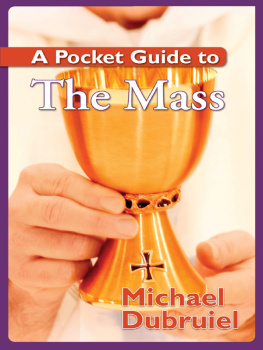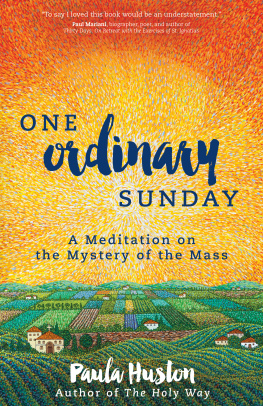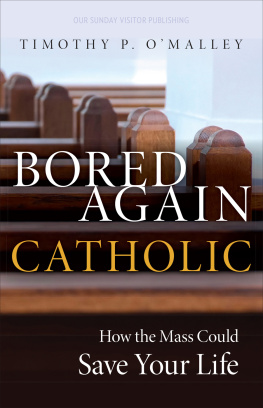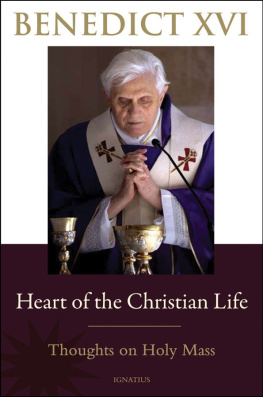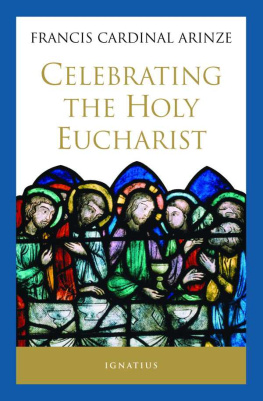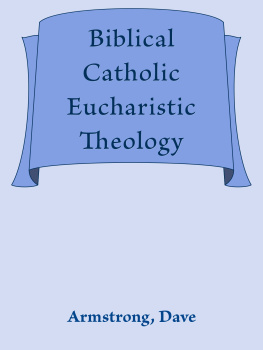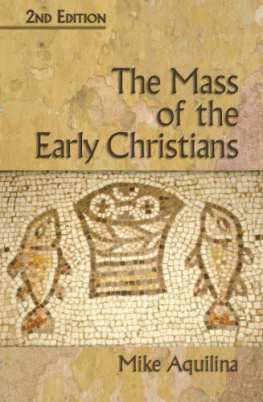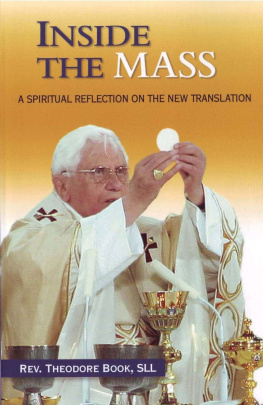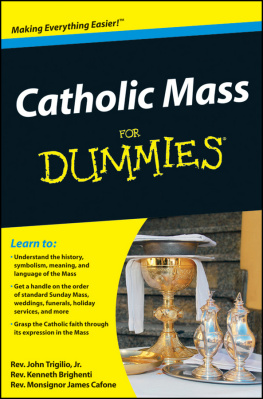
Contents

Introduction
Reconnecting Mass and Daily Living
1 Beginning with the End in Mind
Thanks Be to God
2 From Individuals to Community
The Introductory Rites
3 A Healthy Dose of Humility
The Penitential Act
4 Ordinary Lives in an Extraordinary Context
The Scripture Readings
5 Making Sense out of Life
The Homily
6 In God We Trust
The Profession of Faith
7 Pray as if Your Life Depended on It
The Prayer of the Faithful
8 Stewards of Gods Gifts
The Presentation of the Gifts
9 We Give Thanks and Remember
The Eucharistic Prayer
10 Courage and Confidence
The Lords Prayer
11 Let Peace Begin with Me
The Sign of Peace
12 God Alone Sustains Us
Holy Communion
13 Go!
The Concluding Rites
14 Living the Mass
We Are Not Alone

Reconnecting Mass and Daily Living
H ow would you like to meet God? What if you had the opportunity to encounter God in a very real and personal way each and every week and build a relationship with him that would carry you through the other six days of the week? That opportunity exists, and you are invited. Its called the Mass.
Perhaps youve never thought of the Mass as a life-changing event. When you stop to think of it, however, how could an encounter with the Creator of the universe not be life-changing? We, as Catholics, believe that the Mass is Gods most profound way of entering into the lives of his people. It can and should make a difference. So why do only 2535 percent of Catholics actually attend Sunday Mass? People give various reasons, blaming their disinterest on everything from the changes that followed the Second Vatican Council and the more recent sex-abuse scandal to poor music and weak preaching. These and other factors have played a role in some Catholics decisions to stop attending Mass.
We propose another reason. Too many of us Catholics do not understand our baptism; we think that our baptism was a once-and-done event as opposed to something we are called to practice each and every day. Think about it. If someone asks you, Are you a practicing Catholic? chances are, you will answer based on whether or not you attend Mass on Sunday. Now, lets rephrase that question.
Are you practicing your baptism?
This question seems a lot harder to answer, doesnt it? Taking the time to go to Mass is one issue. Waking up each day to practice our baptism is another. In fact, going to Mass on Sunday makes little sense unless we understand it within the context of how we live the other six days of the week. The reason we go to Mass in the first place is because, through our baptism, we have made a commitment to something and to someone. If we truly understood what it means to practice our baptism, we would see more clearly that participating fully, consciously, and actively in Sunday Mass is an integral and necessary part of the ongoing and life-changing experience of following Jesus Christ.
What we Catholics need is a solid connection between what we believe, how we worship, and how we live our faith on a daily basis. Making the Mass more meaningful is not simply about improving the quality of the music played, the homily preached, or the manner in which the altar is decorated (although improvement in these areas is often sorely needed!). Rather, the solution lies in growing in our understanding of Gods connection to our daily lives and how the Mass invites and challenges us to practice our baptism on a daily basis. The solution lies in recognizing that baptism is a commitment to a way of life that needs to be sustained and nourished by celebration of the Eucharist.
This is not just another book that explains the parts of the Mass. There are already dozens of those available. This is a book that challenges us to look at our own way of life. It is a book about how one hour on Sunday morning can and should shape how we live and move and have our being (Acts 17:28) the other 167 hours of the week. It is a book about obligation: not just our obligation to go to church on Sunday but our obligation to live the Catholic way of life that we committed to in baptism, a sacrament of initiation that reaches completion in the celebration of the Eucharist. Our goal is to show that the Mass is not something we attend but something we do and something that prepares us to go forth and do what Jesus asks of us.
Do This in Memory of Me: Do What?
When we hear Do this in memory of me at Mass, we are being reminded that Jesus is telling us to do much more than to go to Mass on Sundays. He is inviting us to choose a way of life that embraces the same selfless love he showed for us. It is this way of life that we have chosen in baptism. One of the main reasons we often dont know what the Mass is sending us out to do is that we dont understand what we promised to do in our baptism in the first place. When we made a commitment to become part of Jesus church (a commitment that was made for us by those who loved us and wanted the best for us if we were baptized as infants), we began the process of being initiated into a way of life. It is no coincidence that in the very early church, members of the church were said to belong to the Way (Acts 9:2; 19:9, 23; 22:4; 24:14, 22).
Just what does this way of life call us to do? The answer lies in the words used in the rite of baptism as the priest or deacon anoints with oil:
God, the Father of our Lord Jesus Christ... now anoints you with the chrism of salvation. As Christ was anointed priest, prophet, and king, so may you live always as a member of his body, sharing everlasting life. [emphasis added]
As disciples of Christ, we are called to love and serve God and others by sharing in Jesus ministry as priest, prophet, and king. This means that in our daily living we are called to do the following:
- As priest: make Jesus present to others; praise and worship God through our lives; offer ourselves and our lives in sacrifice; help others gain access to God; intercede for the needs of the world and act as part of Gods response to those needs; help others find God through us.
- As prophet: speak on behalf of the oppressed; clearly and boldly speak Gods word; bear witness, evangelize and catechize; bring hope to those in despair; challenge people and institutions to be faithful; fearlessly speak out about injustice.
- As king: serve and protect the vulnerable; provide for those unable to provide for themselves; love enemies; lay down our lives for others; work for justice; live with dignity; respect others dignity; restore lives that are broken; represent Gods will; protect our world and all of Gods creation.
At the end of Mass, when the priest or deacon says, Go in peace, he is sending us forth on a mission to share in Jesus ministry as priest, prophet, and king. If we understand that this is our calling, our mandate, then we will better understand what it is we are doing and celebrating at Mass and how the Mass prepares, enables, challenges, and inspires us to go forth and do just that.
While Sunday, our Sabbath, is held traditionally as a day of rest, the word
Next page

